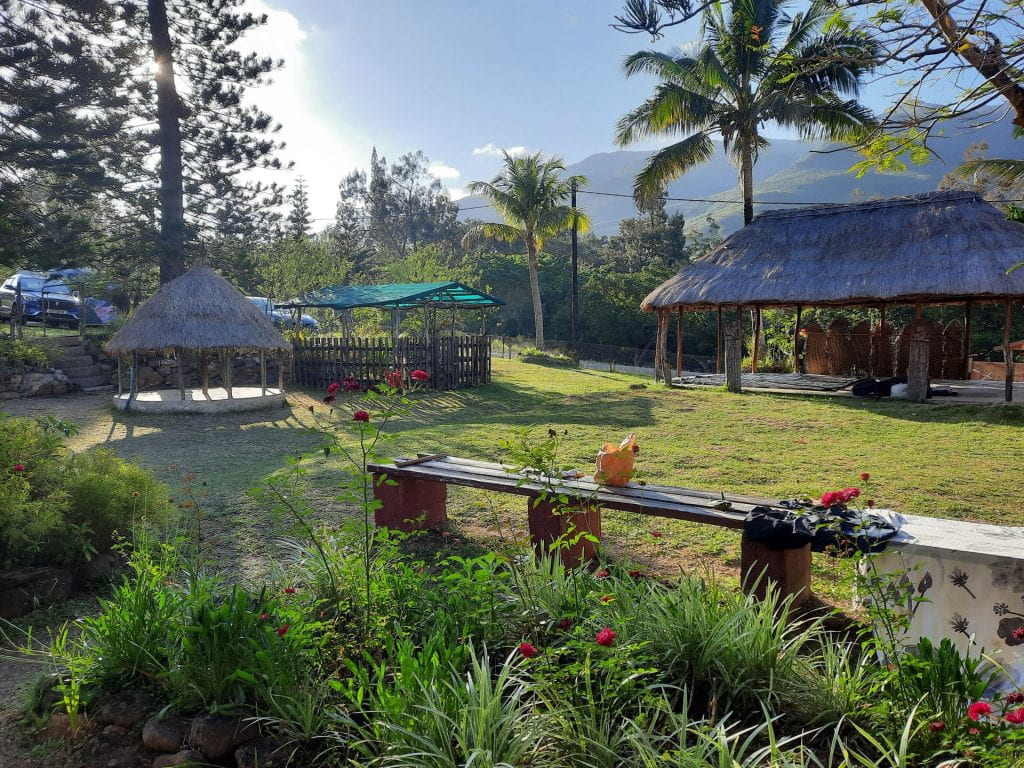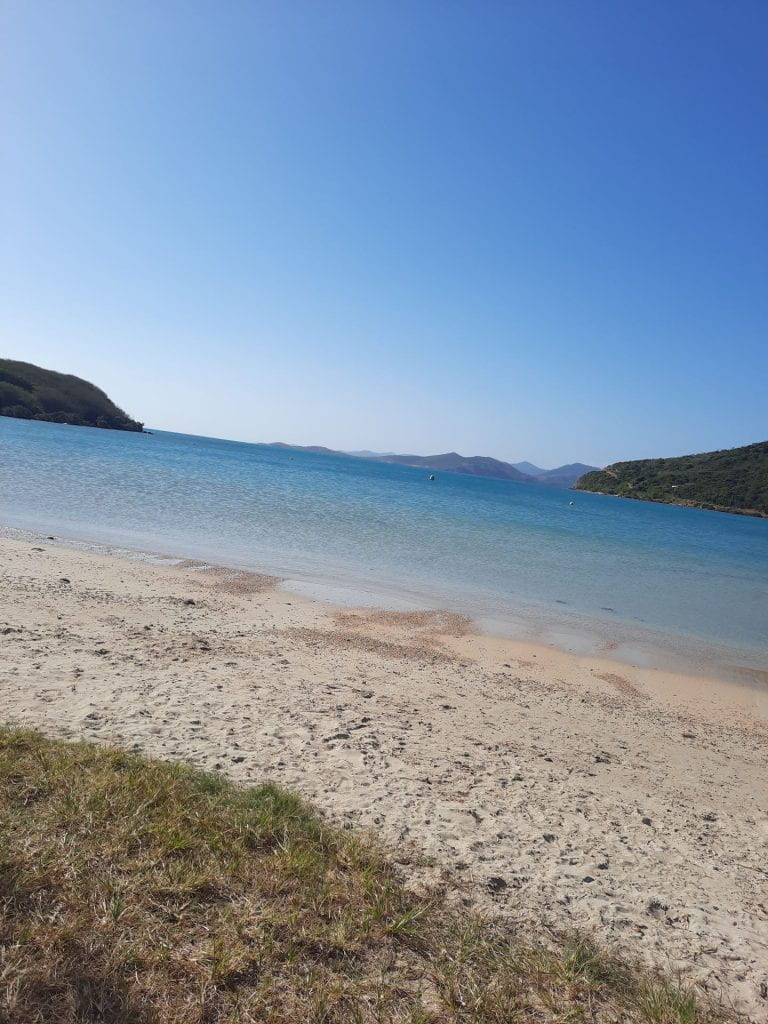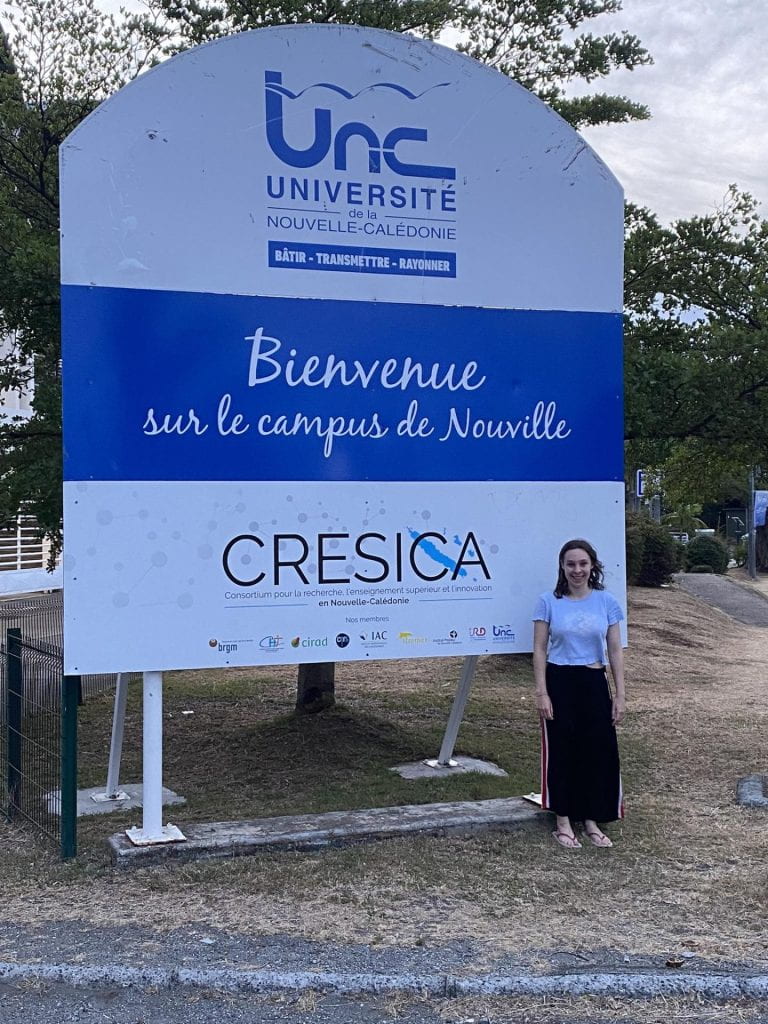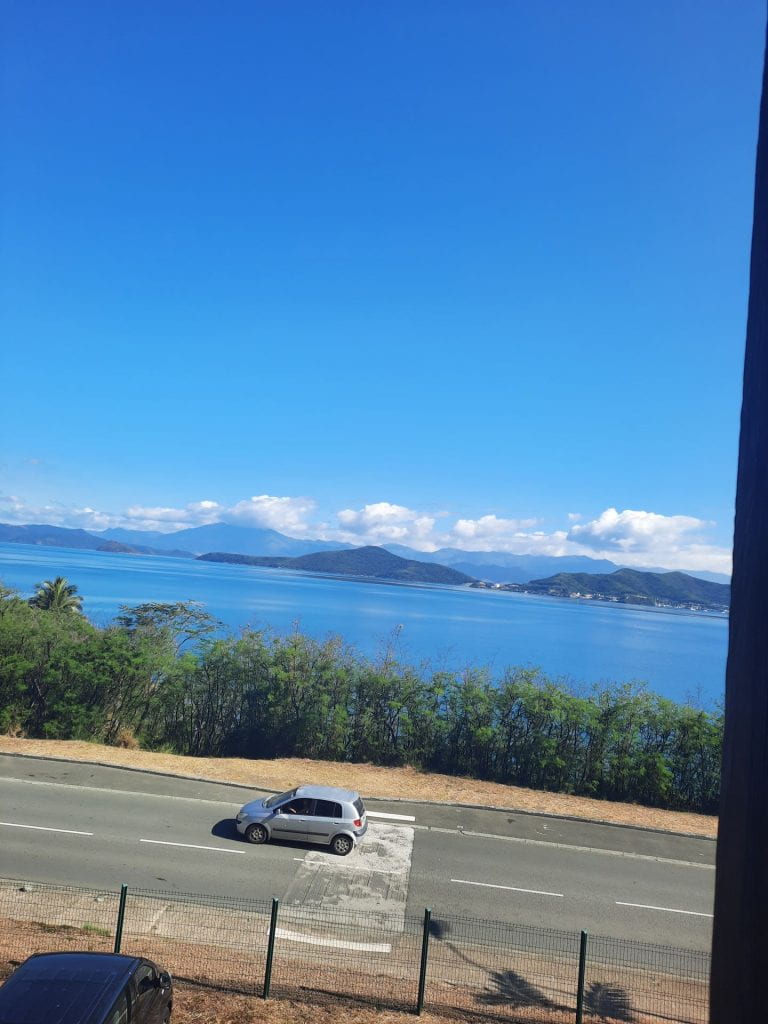
I had an amazing time doing the three-week summer school program in New Caledonia. I found out about this program through the University of Auckland French department, and had also heard about it from other students who had done it previously (prior to covid).
The three weeks went extremely quickly. There were around 23 students doing the course, which meant that we all got to know each other well. The students came from different areas in the Pacific, including New Zealand, Australia and Vanuatu and one the most interesting parts of the experience was learning about everyone’s different cultures and the similarities and differences across the Pacific. Everyone from UNC (the University of New Caledonia) was very welcoming and created an amazing atmosphere where people felt at home. They were always ready to help when needed. A lot of them had good English too, so if there was ever a problem that we couldn’t explain in French they were able to understand it in English. The days were fairly intense, with 4 hours of classes in the morning and then activities or conferences in the afternoon. The group was split into 2 different classes to cater to everyone’s different levels of French. I found that the level I was in pushed me, but it didn’t feel too challenging. Everything that we learnt was very interesting and related to New Caledonia and/or Kanak culture. We also had a portfolio that we had to complete. We were given some class time to work on this, but we also had to spend time working on it outside of class to get it finished. The teachers were very helpful in giving feedback on it before we had to hand it in.
The accommodation was good. Everybody had their own room, with a fridge. Each room also had a ceiling fan which somewhat helped to cool the room at night as it was very hot. We were each given a mosquito net. Each student also had their own shower, and shared a toilet with the neighbouring student. There was a common area with a TV which we sometimes watched movies on together, and also a kitchen. The kitchen was slightly small for the number of people trying to use it, especially in the evening when everyone was individually cooking their own meal, and sometimes you had to wait a while for a hob/stove to be free to use. There were also a few small issues with the number of utensils to use for the number of people there, although for the most part, this was manageable. Although there was sometimes a wait to use a hob, I did enjoy cooking at the same time as other students, and then eating together. The uni took us to the supermarket to buy food on the first day that we were there, and there was also a supermarket near enough to walk to. I would go to the supermarket every few days to buy bread which I would use for lunches, and for dinner I would cook an easy meal, normally pasta. There was a market in Noumea every morning (except on Mondays) that you could bus to and buy food (and other items such as clothes) from too. There was also a cafetaria and another shop on campus which sold food for a relatively cheap price. Occasionally the uni provided food, such as pizza when we had a movie night.
The orientation was good. The night we arrived we were welcomed by a traditional Kanak welcoming ceremony “La coutume”. The next day we were given a tour around the campus. The campus was small, so you learnt your way around it very quickly.
New Caledonia itself was awesome. All the people were so friendly and welcoming, and everyone was keen to share their culture with us. It was very beautiful with all the beaches. Some days it did get very hot, so a big drink bottle was important to make sure that you were hydrated. It was a good thing that the classrooms had either fans or air conditioning, as otherwise doing classes in the heat would have been very difficult. The sun was very hot so it was important to have sunblock. There were also a lot of mosquitoes, so it was very important to have bug spray and also to take cream to put on any mosquito bites. There was a beach (Kuendu Beach) that was a 25-minute walk away or else a 5-minute bus ride away from the uni. I tried to go there when we had time in the afternoons to swim and cool down, although most afternoons we had classes or activities and there wasn’t always time. The beach was lovely and clear, but there was not any shark net which made some students nervous. Although there was no shark net we still swam, but mainly just stayed in the shallows. Baie de Citron is a beach with a shark net and was around a 30-minute bus ride away, so we did go there sometimes. The buses were frequent, but they were fairly expensive, costing 300 xpf a trip. There was an option to get a bus card, or else to get a day pass for 900 xpf, but the day pass was only worth it if you were going to do at least 4 bus trips a day.
The highlight of my program was meeting the other students and all the activities that we did together and the connections that we made. I really enjoyed the cultural day that we had at the residence, where we made a traditional meal together, learnt how to weave with flax and do woodcarving, and learnt traditional dances. Another highlight of the trip was staying at a Tribe for a weekend, and experiencing that way of life. It was awesome to be in a place hearing French all around me and to discover a new culture. By the end of the trip, I came away with a reignited love for French and was really reminded of why I chose to study it.
Challenges of the trip included that sometimes communication was not clear. Sometimes activities were cancelled or would run at a different time to what we had been told, and we were confused as to why this was happening. Things were also fairly expensive in New Caledonia, so making sure not to spend too much money was also somewhat challenging.
If you are considering going a short-term exchange, do it! I had the best time, and the friendships and connections that you will make will be invaluable.
What were the highlights of your experience during your time in the French Summer School?
I enjoyed both our classes in the mornings as well as the conferences and lectures in the afternoons. I liked how the classes also related to the subject areas students studied in New Zealand. For example, some students studied law and one afternoon we had a lecture about New Caledonian law. I study history, and we also had lectures and class work that related to New Caledonia’s history. I particularly liked the week that we spent studying about the history of the penal colony, as the information we talked about was very local to the area we were staying in (e.g. they got the material that the prisoners built with from what is now the international residence where we were staying).
In the higher level class that I was in, the focus was less on how the French language works, but instead on using the language. This meant that we spend a lot of time watching videos and reading articles, and by the end of the three weeks I saw both my reading and listening really improve.
I really enjoyed the speaking classes that we had every day, where we would work with students from UNC. We would often do debates in these classes or sometimes play games. They were a great chance to practice our French and get to share our thoughts on various topics.
Were there any activities that were unique to your host country or university that you would recommend?
The weekend trip to the tribe in the middle of the exchange was amazing. It was awesome to spend the weekend together and to get to experience a different and slower way of life that is very community-centered. This was a particularly great activity as it is something that would be difficult to do if you came just as a tourist. I also really enjoyed the cultural day where we got to do cultural activities and make/eat a traditional meal together. The activities that we did where the New Caledonian students shared their culture with us were the ones that I found the most interesting and special, as you don’t necessarily get that just as a tourist.
I also really enjoyed the day that we spent kayaking on the Dumbea river.
We also learnt 2 traditional songs that we were then able to sing to the tribe to thank them for our stay, which was again a unique experience that you would not get as just a tourist.
What are your top 3 tips for future students attending this programme?
Try and spend time socialising with the other students and all hanging out together, because that’s what builds the connections and creates the memories and friendships which was the best part of the trip. But equally, if you need it don’t be afraid to take some time out to be by yourself to recharge each day so that then you can jump back into being with other people and get the most out of it.
Speak French as much as possible. This is what will help your French to improve the most. Don’t be afraid to speak to the moniters/RAs. They want to help you and to be friends and they don’t care if you make a mistake in what you’re saying. Most of the other students doing summer school came from places that speak English, so it can be very easy to just speak English together when you are not in classes. So to be as immersive as possible try and speak French as much as you can. In the same way, come down and spend the evenings together. The RAs would talk among themselves and with other students in French, so not only is this a great chance to build friendships, but it is also an awesome way to practice listening to French being spoken fluently by native speakers.
Learn about your culture before you arrive. Something I realised during the trip is that I don’t know a lot about NZ culture. The students from UNC are great about sharing their culture with you, so it’s helpful if you know about NZ culture to give back to them/compare with them in return.
Also make the most of every moment, because it goes by so quickly.
How much did you budget? Was this enough? Were there any lessons learned that would help future students budget for their own short-term programme?
I budgeted $1000 as spending money however I didn’t end up using all of it. Most of what I did spend went towards food at the supermarket, although I did spend some on clothes, jewellery etc. I found it helpful to mostly use cash rather than my card so that I didn’t overspend. I also took some snacks over from NZ such as mueslie bars etc., which was helpful as it meant that I didn’t have to spend money on getting a snack between classes every day.
What were the most significant takeaways from your experience with this programme?
This was a huge growing opportunity for me. I realised that I am not very good at talking to other people and I am very shy, but this trip helped me to push past that and make me get out of my comfort zone. It made me realise that I am much more comfortable just sitting with people and listening to them, but I found that the trip extended me to go further than just listening. I feel like I gained so much more confidence by the end of the trip, which was really cool to see.
Throughout the three weeks I also learnt that I needed to prioritize taking some time to be by myself every couple of days, as this helped me to recharge and cope better, and meant that I could get much more out of the classes. I learnt that I need to make sure I have some time to myself, even if it is just 10-15 minutes, rather than feeling constantly pressured to be around people all the time doing stuff with them. This is because it means when I do do things with other people I get much more out of it and feel less drained.
I also learnt a lot about the joy of meeting new people and sharing our cultures. I was so inspired by the students of UNC and how friendly and welcoming they were, and I now aspire to be like that to people who come visit NZ.



